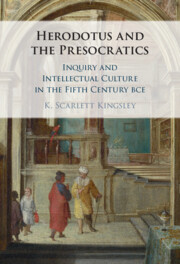Book contents
- Herodotus and the Presocratics
- Herodotus and the Presocratics
- Copyright page
- Dedication
- Contents
- Acknowledgments
- Note on Texts and Translations
- Abbreviations
- Chapter 1 Introduction
- Chapter 2 Relativism, King of All
- Chapter 3 The Pull of Tradition
- Chapter 4 History peri physeos
- Chapter 5 Physis on the Battlefield
- Chapter 6 Historical Inquiry and Presocratic Epistemology
- Chapter 7 Herodotean Philosophy
- Book part
- References
- General Index
- Index Locorum
Chapter 2 - Relativism, King of All
Published online by Cambridge University Press: 07 March 2024
- Herodotus and the Presocratics
- Herodotus and the Presocratics
- Copyright page
- Dedication
- Contents
- Acknowledgments
- Note on Texts and Translations
- Abbreviations
- Chapter 1 Introduction
- Chapter 2 Relativism, King of All
- Chapter 3 The Pull of Tradition
- Chapter 4 History peri physeos
- Chapter 5 Physis on the Battlefield
- Chapter 6 Historical Inquiry and Presocratic Epistemology
- Chapter 7 Herodotean Philosophy
- Book part
- References
- General Index
- Index Locorum
Summary
This chapter surveys the evidence for the sophistic debate on relativism as evident in the fragments of the sophists, including comic and tragic poets. A widespread interpretation of the Histories claims that Herodotus supports nomos without qualification. By contrast, this chapter argues that this claim fails to capture the complexity of Herodotus’ engagement with those figures who use nomos as a rhetorical ploy to justify what is contrary to popular ethics. Similarly, Presocratic thinkers were working through the challenges presented by those who identified nomos as only a relative set of values as opposed to an objective norm to be followed. The Histories’ exploration of the problem of relating custom and law to justice takes place in the context of the rise and expansion of Persian imperialism. Further, it implicates the despot in a relativizing of justice and constitutes a key explanatory paradigm in the Persian attack against the Greek mainland in the Greco-Persian Wars.
Keywords
- Type
- Chapter
- Information
- Herodotus and the PresocraticsInquiry and Intellectual Culture in the Fifth Century BCE, pp. 38 - 91Publisher: Cambridge University PressPrint publication year: 2024



